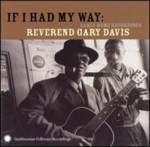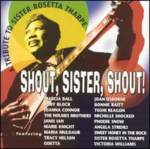By John Cody
• Reverend Gary Davis, If I Had My Way, Smithsonian Folkways, 2003.
 REVEREND Gary Davis (1896-1972) was one of the most influential figures in the history of 20th century blues music. This recently available collection, recorded in 1953, is an important addition to his catalogue.
REVEREND Gary Davis (1896-1972) was one of the most influential figures in the history of 20th century blues music. This recently available collection, recorded in 1953, is an important addition to his catalogue.
Davis preached in the streets of North Carolina until 1944, when he moved to New York City and soon after became an ordained minister. He worked as a street singer and guitar instructor in Harlem, gaining widespread recognition in the mid 50s after the white folk audience discovered him. The blues revival of the 1960s brought an even larger audience, but these recordings – done in his home in 1953 – were made well before those events, when he was making his living strictly within the local Afro-American community.
Ten of the eighteen songs are released for the first time, and were never again recorded by Davis. Of the eight titles he continued to perform throughout his career, two – ‘If I had My Way’ and ‘You Got To Move,’ went on to become standards, later covered by Peter, Paul & Mary, Grateful Dead, Bobby Darin in the case of the former, and ‘You Got To Move,’ covered by the Rolling Stones on 1971’s Sticky Fingers.
Davis’ playing style incorporated gospel, ragtime, blues, popular tunes, jazz and more, but for this session it was strictly gospel. Good thing, as his wife, who accompanies him on some tracks, would leave the room whenever he played anything other than straight gospel. His considerable prowess on the guitar (Davis gave lessons to an impressive list of players, including Ry Cooder, Taj Mahal, Bob Weir (Grateful Dead) Jorma Kaukonen (Jefferson Airplane/Hot Tuna) and David Bromberg) is showcased on the instrumental feature ‘Marine Band.’
Excellent package with informative liner notes make this an essential purchase for Davis fans
• Shout, Sister, Shout! A tribute to Sister Rosetta Tharpe, Various Artists, MC Records, 2003.
 Sister Rosetta Tharpe would have fit well in today’s more open-minded culture. A formidable talent on guitar, as a writer, and a vocalist, she sang gospel, but with strong elements of blues and swing. She performed in churches, night clubs and theatres, displaying a flamboyant stage presence that alienated some potential listeners – the more traditional gospel audience preferred their music unadorned, and the pop audience wanted less God talk. Two decades before gospel-informed acts like Aretha Franklin, Sam Cooke and Ray Charles crossed over into the popular music charts, Rosetta was recording both styles – starting in the late 1930’s – but significantly, she never abandoned the gospel for mainstream success.
Sister Rosetta Tharpe would have fit well in today’s more open-minded culture. A formidable talent on guitar, as a writer, and a vocalist, she sang gospel, but with strong elements of blues and swing. She performed in churches, night clubs and theatres, displaying a flamboyant stage presence that alienated some potential listeners – the more traditional gospel audience preferred their music unadorned, and the pop audience wanted less God talk. Two decades before gospel-informed acts like Aretha Franklin, Sam Cooke and Ray Charles crossed over into the popular music charts, Rosetta was recording both styles – starting in the late 1930’s – but significantly, she never abandoned the gospel for mainstream success.
The daughter of ‘Mother Bell,’ an itinerant singing evangelist, Tharpe was raised with music, and by the age of six was playing guitar with her mother at holiness conventions.
Her songs were covered by Elvis Presley, Johnny Cash, Louis Armstrong, Rod Stewart, and Paul Robeson. For this tribute disc, it’s all sisters taking on Tharpe originals and songs associated with her. Most of the contributors have performed secular and sacred throughout their careers, so there’s a tangible link that cements the project.
Michelle Shocked covers ‘Strange Things Happening,’ adding her own take on Tharpe: “You can be in this world, but you don’t have to be of this world. Sister Rosetta Tharpe she took music to the world. She took it to where they needed to be hearing it the most. She took it to the streets. She took it out of the churches and into the clubs. Some folks say that was strange, for a church lady to be singing in the nightclubs, but she brought the gospel truth to the folks who needed to hear the words who weren’t going to be coming to no church to hear the words. She took it to them. Oh that’s strange.”
Maria Muldaur, Odetta, Janis Ian, Joan Osbourne, Victoria Williams (the latter two accompanied by the Holmes Brothers) are just a few of the artists who offer individual reads on material. The disc ends with Marie Knight, whom Tharpe recorded and toured with for over a decade in the 1940s, and had a hit with ‘Up Above My Head’ in 1946. Knight came out of retirement to perform ‘Didn’t It Rain.’
A bonus CD video clip of Tharpe performing ‘Down By The Riverside’ in the early sixties television show is a revelation. Her formidable presence singing and playing electric guitar makes offers ample evidence why she is revered today.
• Sacred Steel (DVD), Arhoolie, 2001.
A splendid hour-long introduction to the music that has been a mainstay in the Keith Dominion Holiness-Pentecostal Church since the late 1930s. The tradition of worshiping with electric steel guitar has been handed down from generation to generation, and it’s not uncommon to see two generations – even three – together on stage. Played with passion and exuberance, the sound is unique, ranging from meditative to blistering, at all times transcendent. The instrument’s similarity to the human voice is remarkable. In addition to numerous performances, the disc includes excerpts from sermons and individual testimonies.
• Paul Neufeld, Walk Together, True North, 2003.
Toronto Pianist Paul Neufeld is leader of the Rhythm and Truth Brass Band, and co-leader of the NOJO, a sixteen-piece big band. Both ensembles are known for drawing from an eclectic mix of sources, including jazz, funk, gospel, R&B, and world music. Walk Together, his first solo release, is a giant step away from those endeavors. Offering sparse, understated instrumental takes on gospel standards – all traditional with the exception of Duke Ellington’s ‘Heaven,’ – instrumentation is limited to piano, bass and percussion. The approach is similar to Charlie Haden and Hank Jones’ magnificent Steal Away: Spirituals Hymns and Folk Songs (1995) – three of the discs’ eight songs were covered on the Haden/Jones album. Overall, it an enjoyable listen, but at times rather intrusive percussion can spoil the intimacy.
© John Cody 2004
